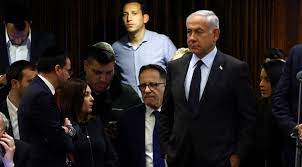Ray Hanania
In November 2019, when Benjamin Netanyahu was indicted on corruption charges, including breach of trust, bribery and fraud, no one could have predicted that his legal troubles might ultimately bring the nation to its knees. Netanyahu has done everything possible to prevent the indictments from moving toward a conclusion. He even embraced the extreme right to win the 2022 election and form a new government, allowing himself to return as prime minister after 18 months in opposition. However, the wily Netanyahu, the longest-serving PM in Israel’s history, had to cut a deal with the far-right extremists, giving radical religious party leaders and settler expansionists unprecedented power.
As long as Netanyahu remains as prime minister, Israel will remain in a constitutional crisis due to his criminal trials, which began in May 2020 and have been dragging through the court system ever since. Although he has been successful in delaying the process, the only way he can derail it altogether is to undermine Israel’s judiciary. And that is exactly what Netanyahu is doing, provoking a massive backlash from Israelis.
Since his return to power in December, Netanyahu has given his allies wide-ranging powers to strengthen the settler movement and increase the oppression of Palestinians, while allowing key Cabinet members to fire up the anti-Palestinian rhetoric, including calling for an entire town to be wiped out. He has strengthened the rights of the far-right religious movement by undermining the rights of secular Israeli Jews. In exchange, his right-wing Zionist and religious allies have backed his proposal to undermine the Israeli judicial system. Netanyahu has introduced a sweeping attempt to restructure the judicial system that essentially aims to change how judges are selected, limit their powers, allow a Knesset majority (i.e., Netanyahu’s government) to overturn Israeli Supreme Court rulings and, more importantly, limit the powers of the judiciary to interfere with the so-called will of the people. Even if Netanyahu is convicted, another new law could allow him to remain in power, as it is now more difficult for a sitting prime minister to be declared unfit for office. Under the legislation that was approved last week, to be declared unfit for office, either only the prime minister himself or a two-thirds majority of the Cabinet would have to vote in favor. The Cabinet vote would then need to be ratified by a supermajority in the Knesset.
Netanyahu’s intention is clear: To change the judicial system so as to undermine the corruption cases against him and prevent his removal from office. Even when he did finally make a concession to protesters on Monday, it was only to delay his planned reforms rather than to scrap them. His effort to reengineer Israel’s judicial system has not only provoked hundreds of thousands of Israelis to protest, but it has also raised ethical issues with some of his right-wing allies. On Sunday, Netanyahu fired Defense Minister Yoav Gallant after he had urged the PM to pause his judicial overhaul. Several other ministers appointed from Netanyahu’s Likud base have also urged him to bring the changes to a halt, with one saying that Israel’s “house is on fire” and another warning that the issue could lead Israeli Jews into a political “civil war” that would tear the country apart. Former Prime Minister Yair Lapid called Gallant’s dismissal a “new low” and wrote on Twitter that Netanyahu “cannot fire the people of Israel who are standing up to the insanity of the coalition.” Benny Gantz, the former defense minister who is now leader of the opposition in the Knesset, tweeted: “We face a clear, immediate and tangible danger to Israel’s security … Tonight Netanyahu put politics and himself above security.”
What is being alluded to by these politicians is that not only has Netanyahu’s judicial overhaul deeply polarized the nation, but that it also portends further risks. Not being directly addressed, however, is the increasing tensions being stoked among Palestinians in the Occupied Territories and inside Israel itself. Netanyahu has given a green light to the armed extremist settler movement to confront Palestinians and expand their settlements. The government has also allowed the Israel Defense Forces to carry out more raids on Nablus, Jenin, East Jerusalem and Hebron, where Palestinian activists are targeted and killed on the false premise that they are engaged in terrorist activity. These extrajudicial killings have provoked Palestinians to resist the assaults by soldiers and also armed settlers, who are often protected by the army. During the first two months of this year, these actions and Palestinian resistance efforts resulted in the deaths of 63 Palestinians and 13 Israelis, in addition to one foreign national and an Israeli soldier. More than 2,000 Palestinians and 25 Israelis were also injured and the numbers have continued to rise this month.
The irony is that Israel is, in terms of Middle East peace, at a crossroads, as a handful of Arab states have agreed to normalize relations with Tel Aviv. If Israel wants to maintain these deals and potentially persuade other states to sign up, it must recognize Palestinian rights.
So, the Israelis are faced with a choice – either turn toward peace and justice or empower the far right to throw the entire nation into turmoil. It is possible that the current turmoil could explode into an even bigger crisis that would challenge Israel’s continued ability to suppress Palestinian rights and block their statehood, resulting in even more violence and death.
Arab News







